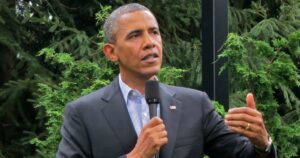Biden snubbed Obama’s outreach during campaign exit drama
Hold onto your hats, folks—President Joe Biden reportedly gave former President Barack Obama the cold shoulder for weeks during one of the most pivotal moments of his political career.
In a stunning display of tension, Biden dodged Obama’s calls in the final stretch before dropping his re-election bid in July 2024, and kept the silence going for nearly a month after, only reconnecting just before the Democratic National Convention.
This isn’t just a petty spat between old pals; it’s a window into a fractured relationship between two Democratic heavyweights who once stood shoulder to shoulder for eight years. Biden, who served as Obama’s vice president, found their dynamic increasingly strained, especially as Obama’s lingering star power often eclipsed his own.
Debate Fallout and Public Pressure Mount
The cracks started showing after Biden’s shaky debate performance against Donald Trump on June 27, 2024, which left Democrats scrambling. Less than a month later, Hollywood heavyweight George Clooney, who had just co-hosted a $30 million fundraiser for Democrats, penned a brutal op-ed in The New York Times on July 10, calling for Biden to step aside. Many whispered that Obama was the invisible hand behind Clooney’s sharp words.
At that fundraiser, Biden’s struggles were painfully public—he froze on stage and needed Obama to guide him off, a moment that surely stung. It’s no surprise that Biden might’ve felt betrayed when Clooney declared that Biden “cannot win,” a jab that echoed the growing chorus of party insiders. But let’s be real: if your old boss is rumored to be nudging you out via op-eds, picking up the phone might not be top priority.
In fact, as Jonathan Karl reveals in his upcoming book “Retribution: Donald Trump and the Campaign That Changed America,” “Obama had been trying to get in touch with Biden for about two weeks, but his calls had not been returned.” That’s a long time to leave a former president on read, especially one you’ve worked with so closely. One has to wonder if Biden was signaling that he’d had enough of being in Obama’s shadow.
Tensions Behind White House Walls
The strain wasn’t just about campaign drama; it simmered even during Obama’s visits to the White House. A Biden official confided to The Post that “Obama caused tension when he would visit the White House because he operated as if he still ran it.” If that’s true, it’s easy to see why Biden might’ve felt like a guest in his own house.
The same official added, “He made Biden feel secondary in the room even when staffers were present.” Ouch—that’s not just a slight, it’s a power play that would rankle any sitting president. While Obama’s camp hasn’t commented, this paints a picture of a dynamic where old hierarchies refused to budge.
Biden wasn’t just ignoring Obama; he also sidestepped calls from former House Speaker Nancy Pelosi, who was spearheading efforts among congressional Democrats to push him out. With poor polling numbers and mounting pressure from within his party, Biden leaned on a tight circle of advisers and family instead. It’s a classic move—when the political vultures circle, you hunker down with those you trust most.
Biden’s Exit and Harris’s Swift Rise
Ultimately, Biden made the call to end his campaign, a decision that shocked many but seemed inevitable given the drumbeat of dissent. Just 27 minutes after stepping back, he endorsed Vice President Kamala Harris as his successor, a rapid move reportedly at Harris’s urging to prevent a messy party fight. That’s playing chess, not checkers—cutting off infighting before it could start.
Harris, for her part, played it cautious after the debate debacle, avoiding calls to congressional Democrats to rally support for Biden. She worried such outreach might be misread as an early grab for the nomination, a savvy if overly careful stance. After all, in politics, perception can be deadlier than reality.
Despite the quick endorsement, Harris’s path forward wasn’t enough to turn the tide—she clinched the Democratic nomination but fell to Donald Trump in a decisive Electoral College loss. It’s a bitter pill for Democrats, who also saw her become the first in two decades to lose the popular vote.
Reflections on a Fractured Alliance
Jonathan Karl’s book, set for release on October 28, promises more juicy details on this saga, with excerpts already making waves via the Dispatch. Neither Biden’s spokesperson nor Obama’s representative offered comments on these revelations, leaving us to piece together the fallout.
What’s clear is that Biden’s refusal to engage with Obama during this critical window speaks volumes about trust—or the lack thereof—between two men who once defined Democratic unity. It’s a sad footnote to a partnership that shaped an era, now marred by unspoken grudges and public humiliations.
At the end of the day, politics is a brutal game where even old allies can become liabilities. Biden’s silence toward Obama might’ve been his way of reclaiming control in a moment of chaos, but it also underscores how quickly loyalty can erode under pressure. Let’s hope future leaders take note—because ignoring yesterday’s mentor could cost tomorrow’s legacy.



